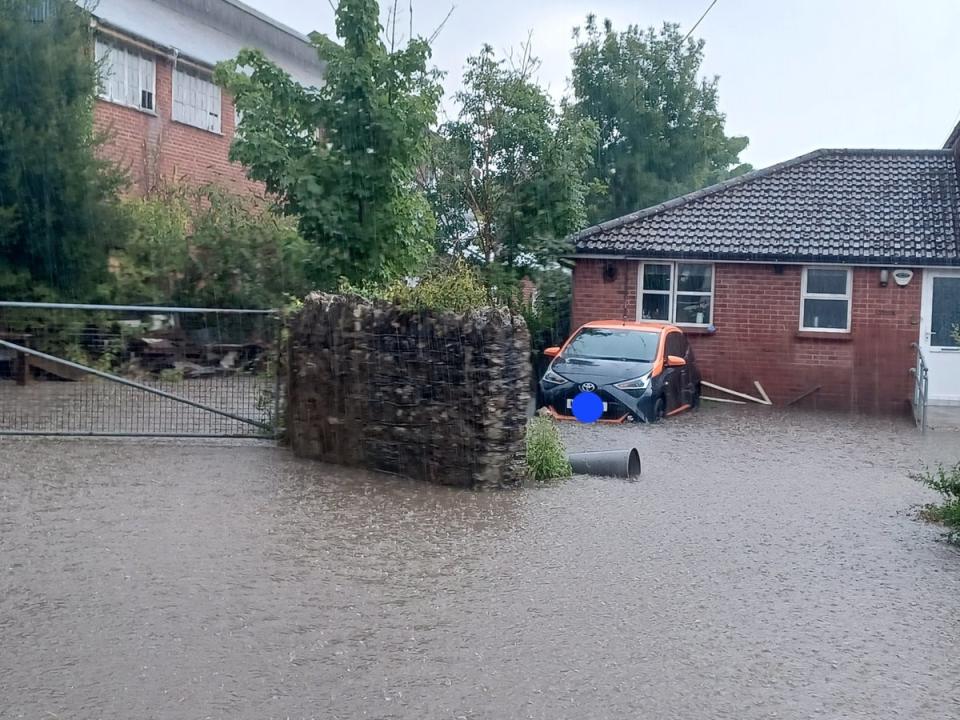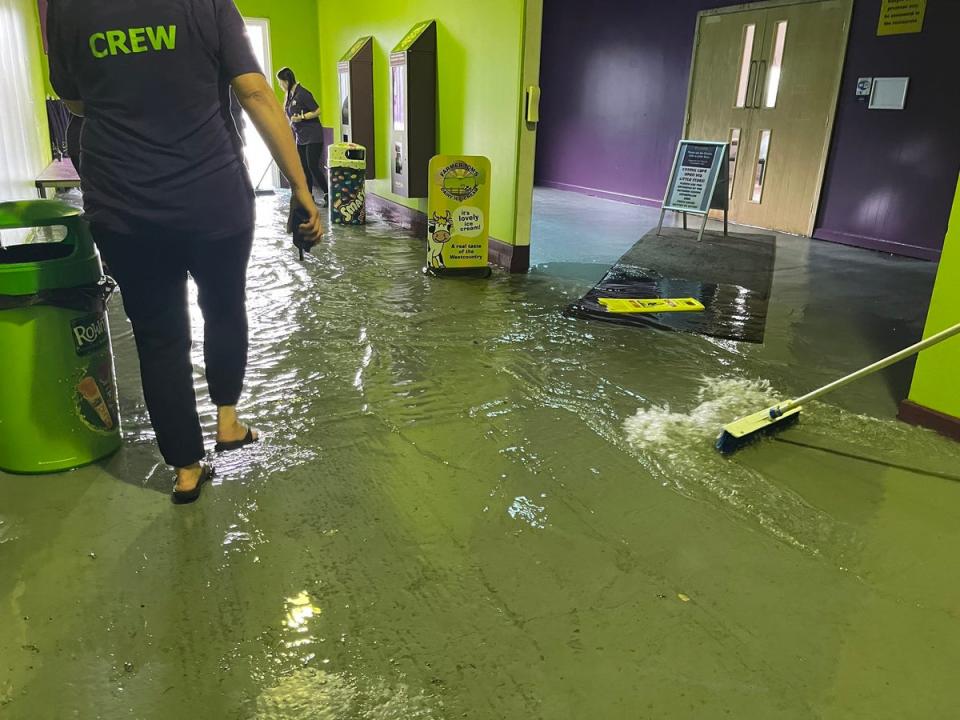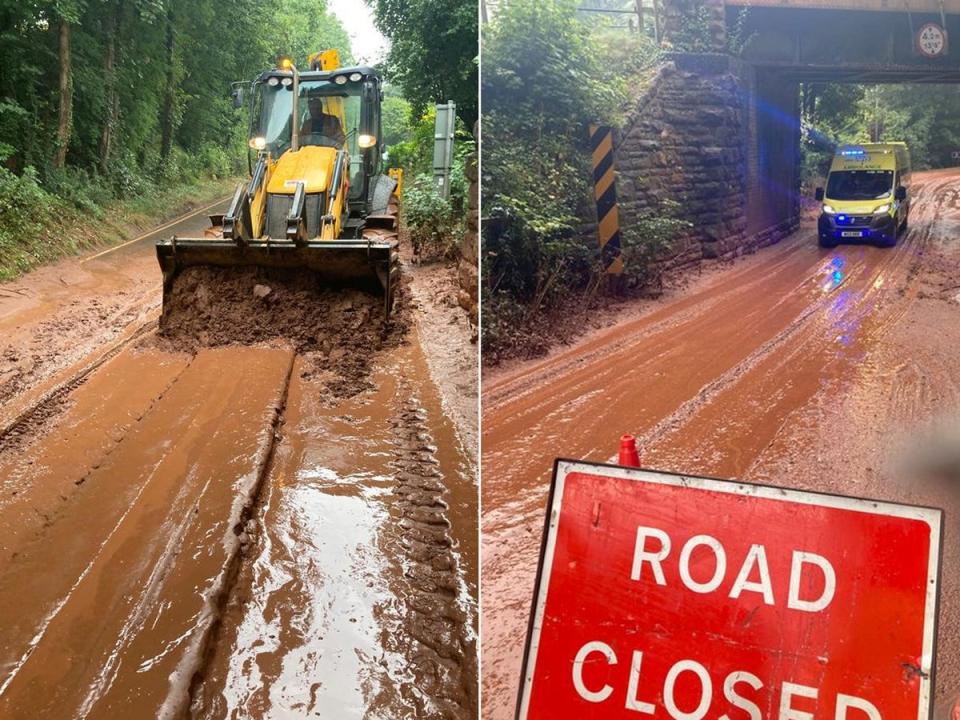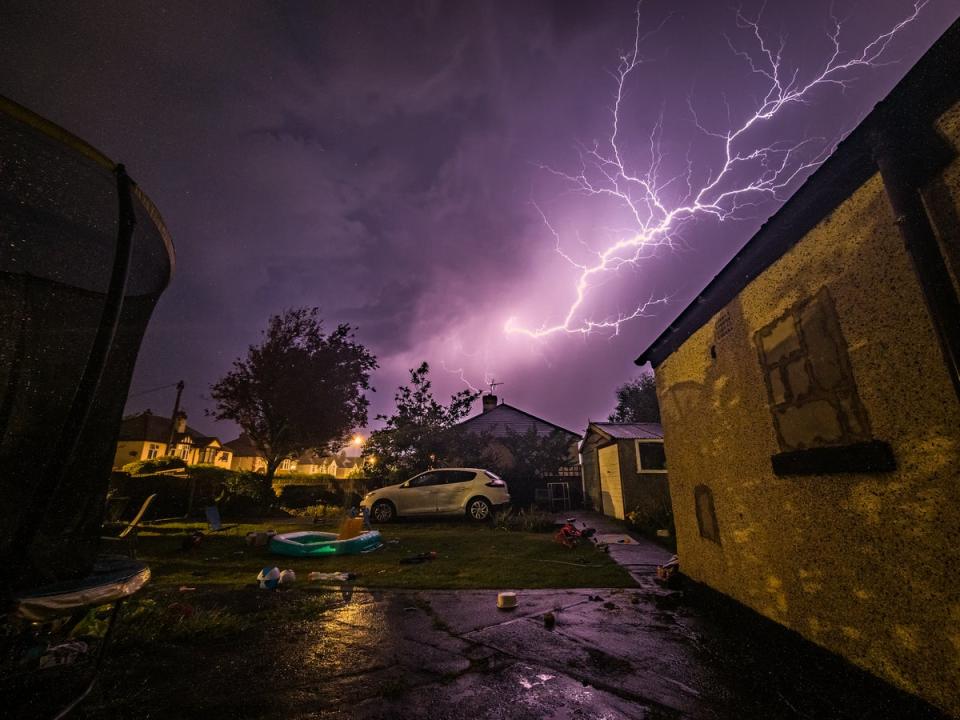UK weather: Flash floods and mudslides as month’s rain could fall in three hours during torrential downpours
Torrential downpours and thunderstorms have brought flash floods and mudslides to parts of Britain, as the long-awaited deluge overwhelmed parched land scorched by weeks of extreme heat.
Roads were turned into rivers in England’s southwest, railway tracks were submerged in Scotland, and rainwater poured through the roof of one supermarket in Wales, as millions of people were warned to brace themselves for the risk of flooded homes.
Londoners living in low-level properties were urged on Tuesday to prepare a “grab bag” of valuables and use sandbags to limit water flows, as the Met Office told The Independent that a few areas in England could see up to 60mm of rainfall in less than three hours on Wednesday – with downpours of between 20 and 30mm expected more widely elsewhere.
It comes after England has seen its driest July since 1935, with an average of just 23.1mm of rainfall during the entire month. This compares with a typical monthly average in August of 53mm for Greater London and 49.5mm across the vast region served by Southern Water.
Experts have warned that this sudden rainfall could result in flash floods as the parched ground is unable to absorb the deluge, and the Met Office has put in place a yellow warning for thunderstorms across southern England and parts of Wales until midnight on Wednesday.
The national forecaster warns that “flooding of homes and businesses could happen quickly, with damage to some buildings from floodwater, lightning strikes, hail or strong winds”, with the potential for fast-flowing or deep floodwater to cause “a danger to life”.
The Environment Agency has put out 26 flood alerts, mostly concentrated in Greater London and parts of the Midlands.

London’s mayor Sadiq Khan said he had written to tens of thousands of Londoners who live in homes that could be affected by flash flooding, while the London Fire Brigade’s Assistant Commissioner, Patrick Goulbourne, urged residents – particularly those in basement properties – to “pay attention to weather alerts and prepare a flood kit or grab bag”.
“People can use sandbags to limit the water flow and move belongings to a higher level,” he said, adding: “A flooding ‘grab bag’ should contain insurance and other important documents, mobile phones and chargers, emergency cash, and any medication, according to the National Flood Forum charity.
“For parents with young children, it should also include nappies, a favourite toy, clothing, wipes, milk and baby food.”

Footage and photos shared to social media on Tuesday showed torrential rain and floodwater sweeping through towns across southern England and Wales, including Newquay in Cornwall, Bishop's Tawton in Devon, Haywards Heath in West Sussex, Port Talbot in south-west Wales, and Bridport in Dorset.
In Perth, where Tory leadership contenders Rishi Sunak and Liz Truss were visiting ahead of a hustings event on Tuesday night, Network Rail apologised for travel delays, sharing images of flooding on tracks near the city’s station which caused a signalling fault.
🚦 We're dealing with flooding at Perth station that’s causing a signalling fault. Sorry if you’re being delayed by this incident.
Our team have pumps in place to clear the floodwater ASAP. Once that's done, we'll be able to signal trains normally again. @ScotRail @CalSleeper pic.twitter.com/yb4f8q2kIR— Network Rail Scotland (@NetworkRailSCOT) August 16, 2022
Some 400 miles south, in Port Talbot, footage taken by a customer at a supermarket in Merthyr Tydfil showed a downpour leaking through the shop’s roof, as rain pounded the street outside.
And in Somerset, the A358 was closed for much of Tuesday due to an overnight mudslide at Combe Florey, which saw a response team forced to remove more than 50 tonnes of mud, sand and potatoes.
The incident prompted council workers to joke their team were “working hard to ensure no chips on drivers’ windscreens” before the road reopened at around 3pm.

Motorists on the M1 also reportedly experienced delays, as surface water and flooding forced the closure of one lane and a slip road in Derbyshire.
In southeast London, the BBC reported Network Rail as saying that a suspected lightning strike near Hither Green had caused signalling problems and a power failure, causing delays for rail passengers.
Meanwhile, swimmers have been warned of sewage and pollution at several beaches on English coastlines, linked to the heavy rain.
According to data gathered by environmental campaign group Surfers Against Sewage (SAS), there has been storm sewage discharge into the waters at beaches in Cornwall, Devon, Sussex, Essex, Lancashire, Lincolnshire, Northumberland and Cumbria.

Met Office forecaster Matthew Box told The Independent that several of its rain gauges had picked up rainfall levels of 10 to 12mm within an hour on Tuesday, adding: “Those sorts of values are distributed everywhere from southern England up to the Midlands and parts of Wales – so where there are showers there are risks of those sorts of values.”
People in areas covered by the Met Office’s weather warning can expect “heavy thundery downpours again tomorrow, with similar sorts of figures expected for the amount of rain”, Mr Box said.
“We’re talking about 20 to 30mm in an hour, and maybe up to 60mm in a few spots in less than three hours,” he said, adding: “That’s a lot of rain in a short amount of time.”
“I think the main risk will be really through Wednesday daytime, with the risk diminishing in the evening as we lose the daytime heating,” Mr Box said.
According to the Met Office, a whole month’s worth of rainfall can often arrive in just two or three heavy downfalls during the summer months. However, seeing a month’s rainfall in a matter of hours is not as common.
The National Flood Forum warned on Tuesday that, despite flooding becoming a “regular pattern” of the UK, the country is still “reactive and not proactive” about the risk.
“Flooding has definitely increased and certainly the length of time that I've been working in flood risk, and we see it now as a regular pattern, don't we, every year,” Heather Shepherd told LBC, adding: “I still think we are quite reactive and not proactive.
“As soon as it's not in the headlines, flooding, we tend to be a bit too laid back.”

 Yahoo News
Yahoo News 
